-
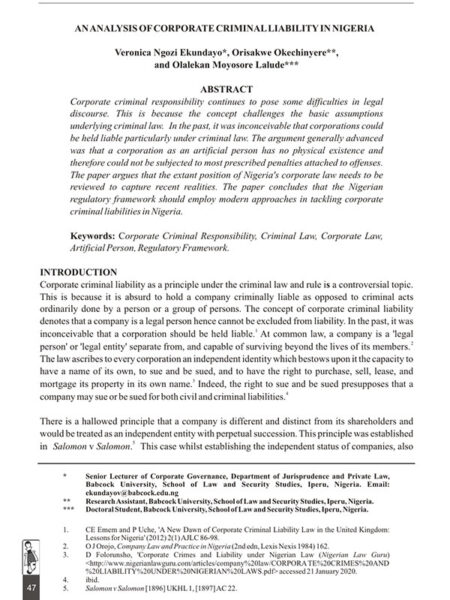
An Analysis of Corporate Criminal Liability in Nigeria
0₦2,500.00Veronica Ekundayo, Orisakwe Okechinyere, and Olalekan Lalude all of the Babcock University, School of Law and Security Studies Iperu Nigeria, in their article An Analysis of Corporate Criminal Liability in Nigeria, examine the concept and jurisprudential underpinnings of corporate criminal liability. They explore Nigerian criminal statutes providing for liability of companies for criminal infractions. They also consider judicial attitude to corporate criminal liability in Nigeria, the practice in other jurisdictions and conclude that the Nigerian regulatory framework should employ modern approaches in tackling corporate criminal liability in the country.
-
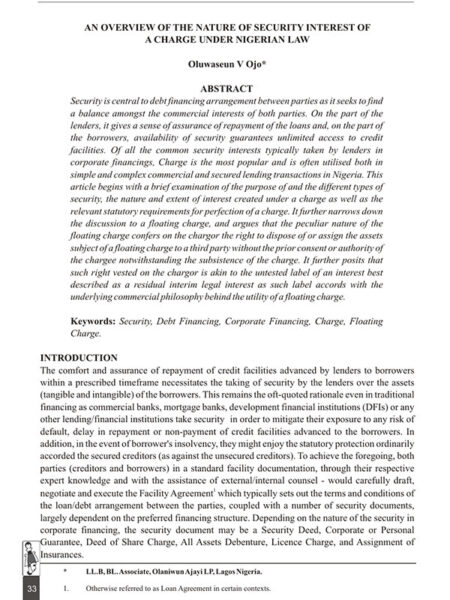
An Overview of the Nature of Security Interest of a Charge under Nigerian Law
0₦2,500.00Oluwaseun Ojo, Associate at Olaniwun Ajayi LP undertakes An Overview of the Nature of Security Interest of a Charge under Nigerian Law. He observes that security is central to debt financing arrangement between parties as it seeks to find a balance amongst the commercial interests of both parties. On the part of the lenders, security gives a sense of assurance of repayment of the loans and, on the part of the borrowers, availability of security guarantees unlimited access to credit facilities. Of all the common security interests typically taken by lenders in corporate financings, the Charge is the most popular. It is often utilised both in simple and complex commercial and secured lending transactions in Nigeria. Ojo examines the purpose of and the different types of security, the nature and extent of interest created under a charge and relevant statutory requirements for perfection of a charge.
-
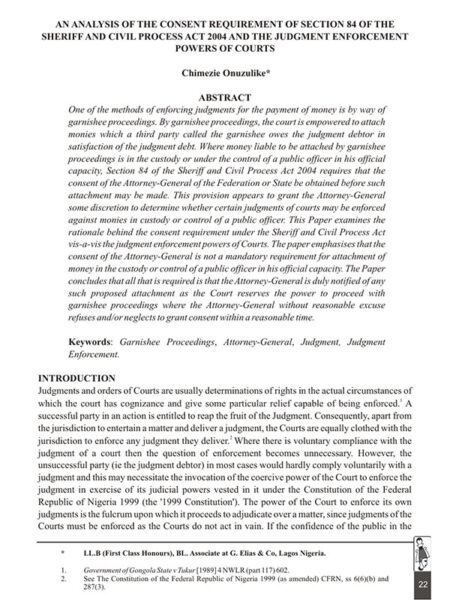
An Analysis of the Consent Requirement of Section 84 of the Sheriff and Civil Process Act 2004 and the Judgement Enforcement Power of Courts
0₦2,500.00Chimezie Onuzulike, Associate at G. Elias & Co in his article An Analysis of the Consent Requirement of Section 84 of the Sheriff and Civil Process Act 2004 and the Judgement Enforcement Power of Courts,notes that where money liable to be attached by garnishee proceedings is in the custody or under the control of a public officer in his official capacity, Section 84 of the Sheriff and Civil Process Act 2004 (SCPA) requires that the consent of the Attorney-General of the Federation or State be obtained before such attachment may be made. This appears to grant the Attorney-General some discretion to determine whether certain judgments of courts may be enforced against monies in custody or control of a public officer. Chimezie examines the rationale behind 84 SCPA vis-a-vis the sacrosanct judgment enforcement powers of the court.
-
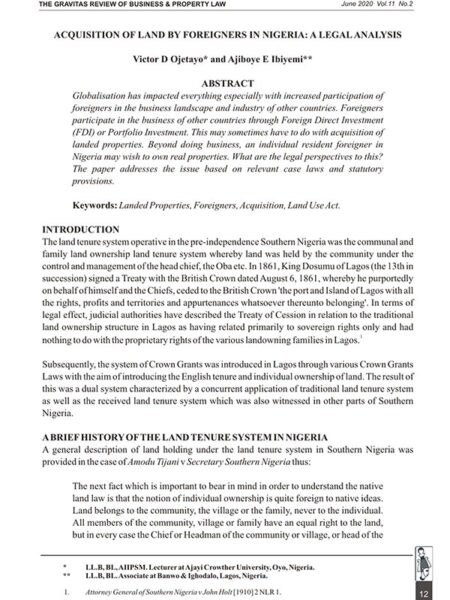
Acquisition of Land by Foreigners in Nigeria: A Legal Analysis
0₦2,500.00Victor Ojetayo of the Ajayi Crowther University Oyo Nigeria and Ajiboye Ibiyemi in their article, Acquisition of Land by Foreigners in Nigeria: A Legal Analysis, note that with the increased participation of foreigners in Nigeria’s economic landscape through Foreign Direct and Portfolio Investments, resident and non-resident foreigners may wish to own real property in Nigeria. Ojetayo and Ibiyemi present an exposition of relevant case laws, the Land Use Act, Acquisition of Land by Alien Law and other statutes for their perspective on acquisition of land by foreigners in Nigeria.
-
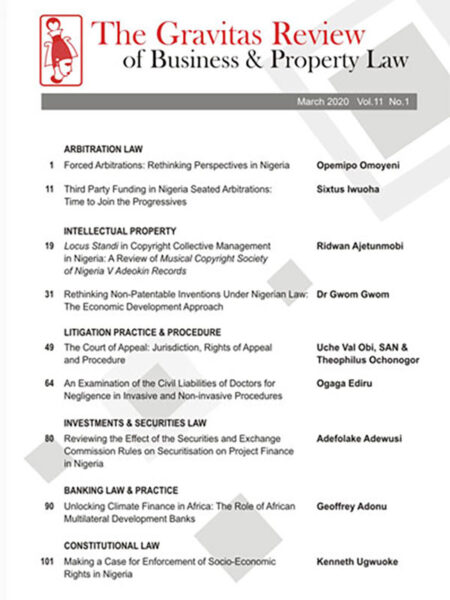
The Gravitas Review of Business & Property Law Vol.11 No.1 – Print
0₦5,000.00In this issue of The Gravitas Review of Business & Property Law Vol.11 No.1, there are well researched articles on:
- Arbitration
- Intellectual Property
- Litigation Practice & Procedure
- Investments & Securities Law
- Banking Law & Practice
- Constitutional Law
-

The Gravitas Review of Business & Property Law Vol.11 No.1 – E-Book
0₦5,000.00In this issue of The Gravitas Review of Business & Property Law Vol.11 No.1, there are well researched articles on:
- Arbitration
- Intellectual Property
- Litigation Practice & Procedure
- Investments & Securities Law
- Banking Law & Practice
- Constitutional Law
-

The Gravitas Review of Business & Property Law Vol.11 No.1
0₦5,000.00In this issue of The Gravitas Review of Business & Property Law Vol.11 No.1, there are well researched articles on:
- Arbitration
- Intellectual Property
- Litigation Practice & Procedure
- Investments & Securities Law
- Banking Law & Practice
- Constitutional Law
-
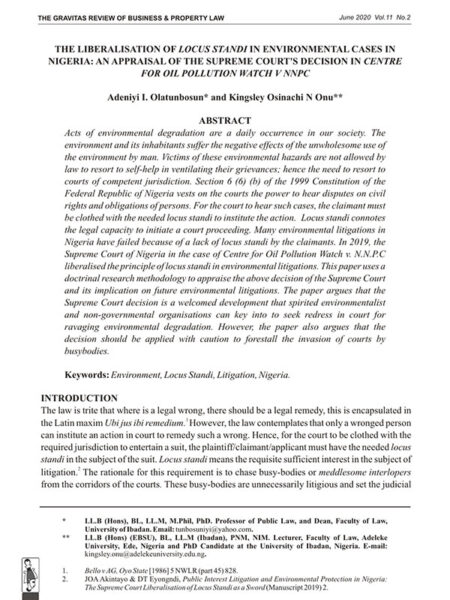
The Liberalisation of Locus Standi in Environmental Cases in Nigeria: An Appraisal of the Supreme Court’s Decision in Centre for Oil Pollution Watch v NNPC
0₦2,500.00Adeniyi Olatunbosun, Professor of Public Law, and Dean Faculty of Law, University of Ibadan, Nigeria and Kingsley Onu, Lecturer Adeleke University Ede Nigeria in their article, The Liberalisation of Locus Standi in Environmental Cases in Nigeria: An Appraisal of the Supreme Court’s Decision in Centre for Oil Pollution Watch v NNPC, comprehensively examine the concept of locus standi in environmental cases. They review the decision of the Supreme Court in COPW V NNPC regarding the locus standi of a non-governmental organisation to sue for an act of environmental degradation. They conclude with an analysis of the effect of the Supreme Court’s decision on future of environmental litigations in Nigeria.
-
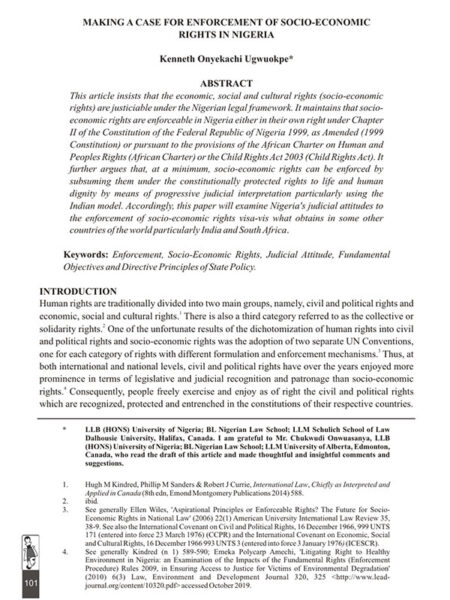
Making a Case for Enforcement of Socio-Economic Rights in Nigeria
0₦2,500.00Kenneth Ugwuokpe in his article, Making a Case for Enforcement of Socio-Economic Rights in Nigeria, insists, no doubt controversially, that the economic, social and cultural rights indicated as “fundamental objectives and directive principles of state policy” in the 1999 Constitution of Nigeria, are justiciable under the Nigerian legal framework. Kenneth argues that the socio-economic rights are enforceable in Nigeria either in their own right under Chapter II of the Constitution or pursuant to the provisions of the African Charter on Human and Peoples Rights or the Child Rights Act 2003. He further posits that, at a minimum, socio-economic rights can be enforced by subsuming them under the constitutionally protected rights to life and human dignity by means of progressive judicial interpretation, particularly using the Indian model. He examines Nigeria’s judicial attitudes to the enforcement of socio-economic rights vis-a-vis what obtains in some other countries, notably India and South Africa.
-
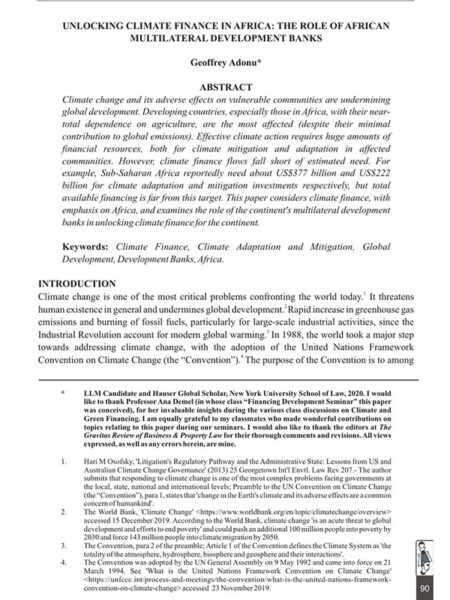
Unlocking Climate Finance in Africa: The Role of African Multilateral Development Banks
0₦2,500.00Geoffrey Adonu, Graduate Student at the New York University School of Law in, Unlocking Climate Finance in Africa: The Role of African Multilateral Development Banks, argues that climate change and its adverse effects on vulnerable communities are undermining global development. Developing countries, especially those in Africa, with their near-total dependence on agriculture, are the most affected despite their minimal contribution to global emissions. Effective climate action requires enormous amounts of financial resources, both for climate mitigation and adaptation in affected communities. However, climate finance flows fall short of the estimated need. Sub-Saharan Africa reportedly needs about US$377 billion and US$222 billion for climate adaptation and mitigation investments respectively, but total available financing is far from this target. Geoffrey considers climate finance, with emphasis on Africa, and examines the role of the continent’s multilateral development banks in unlocking climate finance for the continent.
-
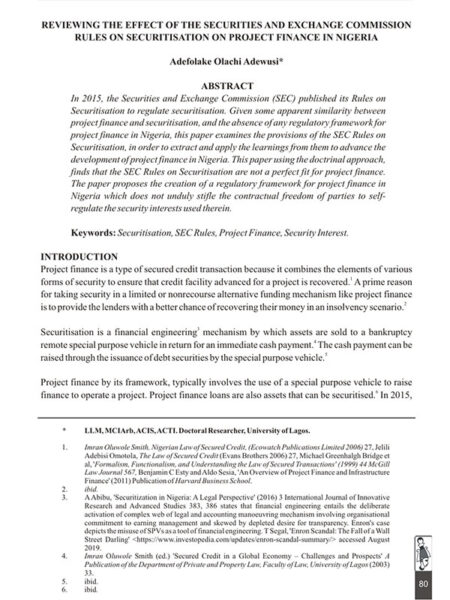
Reviewing the Effect of the Securities and Exchange Commission Rules on Securitisation on Project Finance in Nigeria
0₦2,500.00Adefolake Adewusi, Doctoral Researcher at the University of Lagos in her article, Reviewing the Effect of the Securities and Exchange Commission Rules on Securitisation on Project Finance in Nigeria, posits that the Securities and Exchange Commission (SEC) published its Rules on Securitisation in 2015 to regulate securitisation. Given the apparent similarity between project finance and securitisation, and in the absence of any regulatory framework for project finance in Nigeria. Adefolake examines the provisions of the SEC Rules on Securitisation to extract and apply the principles from them to advance the development of project finance in Nigeria. She argues that the SEC Rules on Securitisation are not a perfect fit for project finance and propose the creation of a regulatory framework for project finance in Nigeria which does not unduly stifle the contractual freedom of parties to self-regulate the security interests used.
-
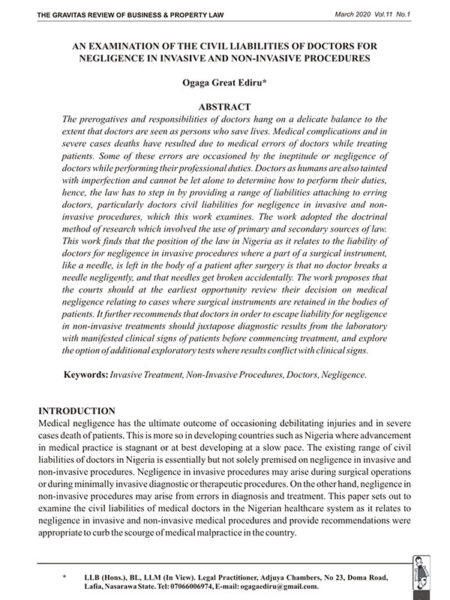
An Examination of the Civil Liabilities of Doctors for Negligence in Invasive and Non-Invasive Procedures
0₦2,500.00Ogaga Ediru of Adjuya Chambers, Lafia, Nasarawa State Nigeria in his article, An Examination of the Civil Liabilities of Doctors for Negligence in Invasive and Non-Invasive Procedures, reviews the liability of doctors for negligence while treating patients. He states that the position of the law in Nigeria as it relates to the liability of doctors for negligence in invasive procedures where a part of a surgical instrument, like a needle, is left in the body of a patient after surgery is that no doctor breaks a needle negligently, and that needles get broken accidentally. Ogaga proposes that the courts should at the earliest opportunity review their decision on medical negligence relating to cases where surgical instruments are retained in the bodies of patients. He recommends that doctors, in order to escape liability for negligence in non-invasive treatments, should juxtapose diagnostic results from the laboratory with manifested clinical signs of patients before commencing treatment, and explore the option of additional exploratory tests where results conflict with clinical signs.
The Gravitas Review of Business & Property Law



